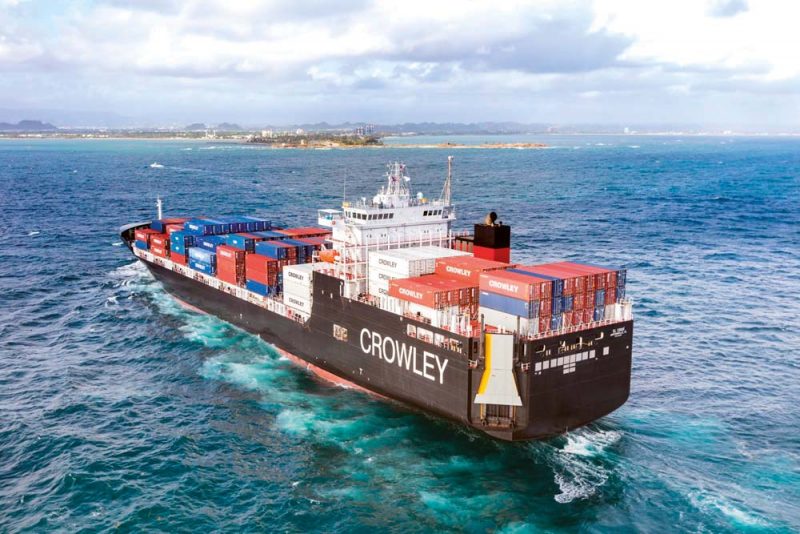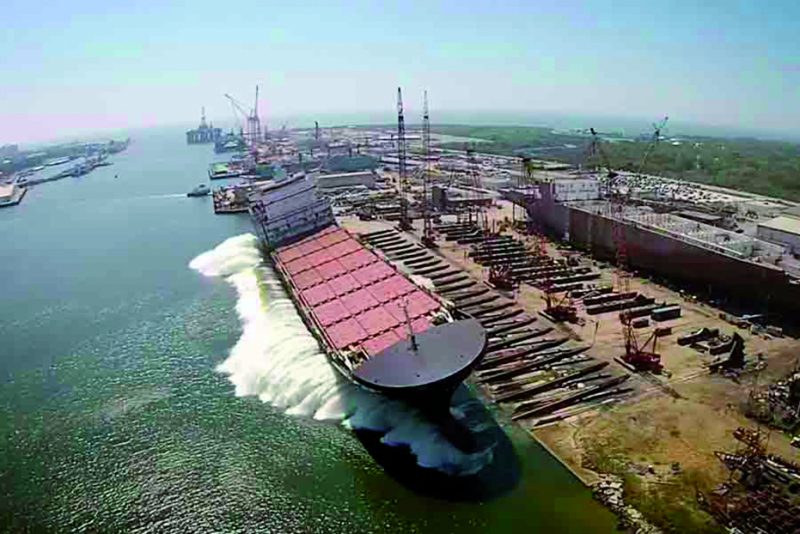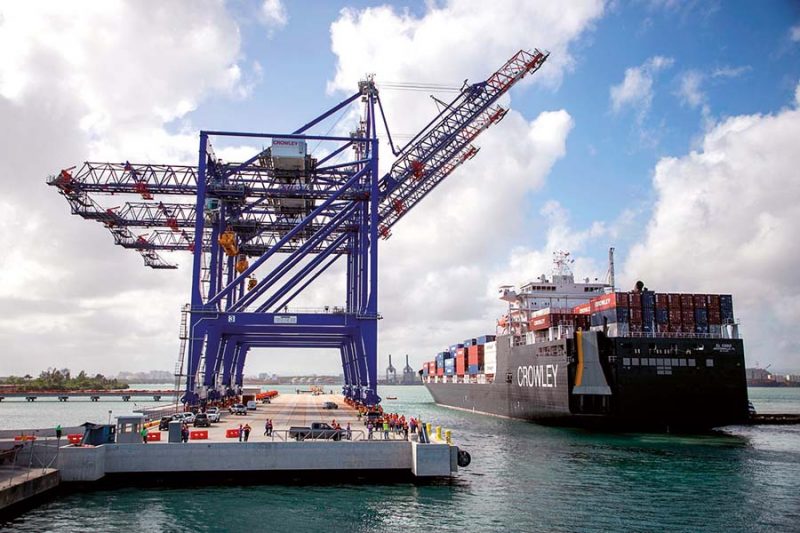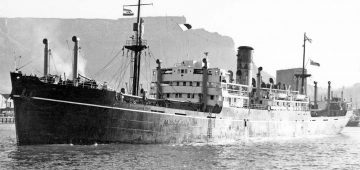
Crowley Maritime Corporation, a multipurpose shipping, logistics, salvage, engineering and offshore company based in Jacksonville, Florida, operates a Lo-Lo/Ro-Ro Liner service between Jacksonville, Florida, U.S.A and San Juan, Puerto Rico. Until recently this has consisted of a fleet of 10 large triple deck barges being hauled by ocean-going tugs. Their cargo capacity has been up to 398 FEU or equivalent units per vessel. The company also operates a fleet of 15 Lo/Lo container vessels internationally with varying TEU capacities. The company can trace its routes back to 1892 when Thomas Crowley bought a Whitehall rowing boat and went into business for himself shuttling personnel and supplies between the San Francisco waterfront and the tall sailing ships that would anchor in San Francisco Bay. From these humble beginnings grew the company that is Crowley Maritime Corporation. The operation now encompasses many elements of the maritime industry, and more besides. The present structure, in which Crowley Maritime Corporation serves as a holding company for business lines and all subsidiaries, was put in place in 1992. The company is wholly and privately owned by the Crowley family and Crowley employees. The six operating lines of business are: Puerto Rico/Caribbean liner services; Latin America liner services; logistics; marine contract solutions; deep sea petroleum transportation; and petroleum transportation plus distribution and sales in Alaska. Notable achievements in recent years include the first licensed commercial cargo delivery directly from the U.S.A to Havana, Cuba, in nearly 40 years on 16th December 2001. That operation continues to this day. The year 2017 marked 125 years of business for the company and 2014 saw Crowley celebrate its 60th anniversary of service to the people and businesses of Puerto Rico. It is this operation that the newbuild focusses on as it enters a new era.
Commitment to the Future
It was back in February 2012 that Wärtsilä Ship Design (WSD) received an inquiry for a very high specification container Ro-Ro vessel for Crowley Maritime. The Ship Building Contract could have been signed before the summer of 2012, but given the novelty of the design linked to the use of relatively new LNG technology, Crowley Maritime wanted to ensure that all possible foreseeable risks were mitigated before the contract was finalised. So, in November 2013 Crowley Maritime Corporation placed the order with VT System’s subsidiary VT Halter Marine for two WSD84 2400 WD LNG ConRo (Combination Container Ro-Ro) ships for an estimated contract value of $350m.The newbuild project was officially confirmed on 1st January 2014 and, dubbed the Commitment (C) Class, the order heralded the start of a mission to modernise the company’s Jacksonville-San Juan (Puerto Rico) Liner Service after 6 decades. The name Commitment Class was chosen to represent Crowley’s commitment to the Puerto Rico Trade, but it was also a fitting tribute to the commitment from firms such as DNV GL, who helped the company design and deliver a safer, smarter, greener class of ships.
Since the beginning of the 1970s Crowley had employed triple deck barges towed by tugs but such a practice has become somewhat dated in the modern-day deep-sea shipping world. This U.S Mainland to Puerto Rico service is the largest domestic (Jones Act) liner trade and, pre-2018, the fleet consisted of four 730-unit capacity and 2x 580-unit capacity triple deck Ro-Ro barges handled by Invader Class Tugs, sailing three times per week from Jacksonville, Florida, and once per week from Pennsauken, New Jersey. The fleet age, the new regulations and the increasing business potential were the main drivers for Crowley looking ahead of its competition and beyond the currently employed shipping practices to create a new fleet of vessels.
Shipping companies in the U.S.A are obliged to adhere to the Jones Act, a federal law that regulates maritime commerce in the United States of America. The Jones Act requires goods shipped between U.S. ports to be transported on ships that are built, owned and operated by United States citizens or permanent residents. Also known as the Merchant Marine Act of 1920, the law is vitally important to maintaining a strong U.S. maritime capability. So, Crowley had set the wheels in motion for the very first LNG powered, American flagged, Container Ro-Ro ships.
The shipyard awarded the contract was VT Halter Marine, a subsidiary of VT Systems, based in Pascagoula, Mississippi, U.S.A. VT Systems specialises in both ship design and construction. A proven track record goes back over 60 years and the company is the largest designer and builder of small to medium-sized ocean-going vessels in the U.S.A. The shipyard at Pascagoula boasts a 12.8m deep shipping channel to/from the open sea at Bayou Casotte with direct access to the Gulf of Mexico from the Mississippi Gulf Coast.
The Commitment Class ships were designed by WSD, in collaboration with Seattle-based naval architecture and marine engineering firm Jensen Maritime, a subsidiary of Crowley. Jensen also manages and supervises the construction activities at the shipyard.
The double-hulled Panamax ConRo ships are intended to carry 2,400 TEUs (20ft equivalent units) and they also offer space for up to 300 refrigerated containers plus almost 400 cars and larger vehicles in an enclosed, well-ventilated and weather-insulated spacious Ro-Ro garage. The ships are 219.50m long with a beam of 32.20m, a hull depth of 18m, a draught of 10.18m and a deadweight of 26,500t. The design is highly energy-efficient and received the DNV class notation and classified as 1A1 general cargo carrier, container, Ro-Ro, Nauticus (new building), gas fuelled, drawn, ground and polished (DG-P) BIS, TMON, BWM-T, E0, NAUT-OC, CLEAN. Because of the recently established Emission Control Area (ECA) along the eastern seaboard of the United States, the vessel design had to meet stringent environmental guidelines while serving the high-performance operational requirements of the owners. Low emissions, reliability, and appropriate transit speed were, therefore, primary considerations. The main propulsion and auxiliary engines of the C Class vessels are powered by LNG, making them some of the world’s first to be powered by this fuel and eliminates the production of sulphur oxide (SOx) and particulate matter (PM) emissions. It also reduces nitrogen oxide (NOx) and carbon dioxide emissions by 92% and 38%, respectively. The ships are designed to operate at speeds up to 22 knots and boast an endurance of 6,000 nautical miles when operating on LNG.
The first steel was cut for Hull 2022 in October 2014 and the keel was laid on 21st January 2015. The two C-Class ships have been appropriately and imaginatively named as El Coquí and Taíno respectively. The El Coquí is a small, chiefly nocturnal, arboreal frog (Eleutherodactylus coquí) native to Puerto Rico that has a high-pitched call and has also been introduced into Hawaii and southern Florida. Taíno is the name for native Puerto Ricans who lived off the land and who had great appreciation and respect for their environment. Such a naming policy is refreshing nowadays considering some of the policies where a ship’s name simply advertises the company or operator plus a number, planet, city etc.

Investing in Tomorrow
The building of the new gas powered sisterships also required further investment to cater for the logistics of operating such tonnage. This amounted to around $200m, so the Commitment Class Modernisation Plan totalled around $550m overall following on from Crowley’s $3 billion of investment across the group in recent years. A new LNG fuelling plant had to be built at JAXPORT’s Talleyrand Marine Terminal in Jacksonville, adjacent to Crowley’s operating terminal, and this was achieved in partnership with Eagle LNG. A pair of one million litre (1000cbm) capacity stainless steel shelled cryogenic LNG tanks were delivered to the new site in spring 2017 by the 12,838gt/2013 built BBC Moonstone. The tanks had been constructed by Chart Industries in Europe. Crowley has served Puerto Rico via the 85-acre Isla Grande Terminal in San Juan since 1954, longer than any other carrier in the trade. Indeed, the company, with 300 Puerto Rican employees, offers more weekly sailings in the market than any other shipping line. The Commitment Class duo will operate on a weekly rotational basis.
A new 275m long and 35m deep quayside was built at Isla Grande along with a 15-acre container handling and storing area. The new facility’s waterfront was dredged as required and three brand new ship-to-shore gantry cranes, manufactured by Liebherr Container Cranes in Ireland, also arrived in spring 2017 aboard Offshore Heavy Transport’s 34,925gt/1993 built submersible heavy load carrier Albatross. This equipment was the first of its kind to arrive in San Juan Harbour in more than five decades. Whilst all the port preparations continued, the El Coquí was launched sideways into her element at VT Halter Marine on 20th March 2017.

At this time sistership Taíno was taking shape alongside her older sibling at the shipyard and she was launched on 4th December 2017. After fitting out and sea trials the El Coquí was delivered to Crowley Liner Services Inc. on 18th July 2018. The maiden voyage departed Jacksonville on 27th July 2018, arriving Puerto Rico on 30th July 2018. The first voyage from Florida conveyed 750 containers and over 300 cars. The Wärtsilä designed ConRo represents a smart, modern vessel with CFD-optimised hull lines for the highest efficiency and lowest accelerations, validated by extensive model tests. The ship has an approximate 70/30 split between container and Ro-Ro cargo stowage areas. The fully enclosed, weather proof vehicle garage is spread over 4 decks aft of the superstructure and can accommodate 387 CEU (car equivalent units) or 370 vehicles of a more varied size. The Ro-Ro garage capacity totals 1,935 lanemetres and access is via a single lane hinged stern quartering ramp port side aft that is 26.7m long overall and 3.2m wide. The layout permits anti-clockwise loading/unloading. Atop of the vehicle garages is a container deck with space for 3 rows of up to 12 containers across and 5 high. Some container space is lost to ventilation outlets for the Ro-Ro garage (containers sit above these) and further capacity is lost to equipment for stowing the stern ramp (port side) and the funnel on the starboard side. The full width central row can accommodate around 60 containers with those fore and aft each having space for around 45 respectively, subject to container sizes being carried. The majority of the crew accommodation is spread across four decks within the superstructure beneath the Navigation Deck. This consists of 23 staterooms for Officers and Crew (single and double) for a standard crew of 22. Crew amenities include a hospital, laundry, Officer/Crew lounges and mess rooms plus a gymnasium. Forward of the accommodation is the bulk of the container capacity with 4 holds consisting of 2 suitable for dangerous goods and 2 equipped with movable sell guides. As mentioned previously, the container loading arrangement is flexible and suits 20ft, 40ft, 45ft, 53ft, High-Cube and Wide-Body types. With her total TEU capacity of 2,400, the forward cargo spaces offer, subject to container sizes carried, 8 rows of containers, 12 wide, on the weather deck with capacity in the four holds varying due to Hold 1 being slightly narrower in the bow and Hold 4 being shallower. The weather deck stacks are to a maximum of 6 units for the first 4 rows forward of the bridge, the next 3 rows are 5 units high and the row in the bow is 4 units high so as to maintain the essential lines of sight for navigation. The maximum TEU capacity on deck (fore and aft) is 840 or 729 FEU (Forty Foot Equivalent Units). The hold capacities are given in FEU with each hold’s maximum capacity indicated as 100 FEU (200 TEU equivalent). As touched on previously, the hold dimensions do vary but the WSD84 2400 WB LNG datasheet does not specify individual hold capacities and neither does the ship’s Operator.
Environmental Obligation

As detailed above, a major factor in the Commitment Class project was to ensure compliance with the new Emission Control Area (ECA) along the eastern seaboard of the U.S.A. The solution chosen was of course to adopt LNG as a fuel but this not only had implications for the shore logistics of the project but also for the design of the ships. LNG tanks are required to be carried on board and the El Coquí has three 770m3 IMO Type C vacuum insulated cryogenic tanks located side by side across the width of the ship below decks and forward of the superstructure with a total capacity of 2,288m3. The tanks are beneath Cargo Hold No.4, hence this space is shallower than Holds 1-3. The LNG is supplied to the main engine at high pressure (around 300 bar) and to the auxiliary engines at low pressure (around 4 bar). The LNG tanks feed both high pressure and low pressure systems with this auxiliary equipment located in the Gas Heating Room on the port side. Here the LNG undergoes regasification having been stored in liquid form at −162°C. via a gentle warming process to atmospheric temperature. The gas supply line in the engine room to the engines is designed with ventilated double-wall piping and gas detectors for emergency shutdown. The purpose of the outer pipe shielding is to prevent gas outflow to the machinery spaces in the event of rupture of the inner gas pipe. Hence the annular space as well as spaces around valves, flanges etc. are equipped with separate mechanical ventilation (30ch/hr) from the outside environment. All gas related piping is manufactured in stainless steel. Permanently installed gas detectors are fitted in the Tank Control Space, Tank Hold Space (THS), in all ducts around gas pipes, in engine rooms, ventilation trunks, compressor rooms and other enclosed spaces containing gas piping or other gas equipment. The exhaust system is designed and built sloping upwards in order to avoid the formation of gas fuel pockets in the system. The LNG system ventilation pipe is visible above the ship’s bridge.
The main engine is a MAN B&W 8S70ME-GI example with an output of 21,160 kW/28,769 Horsepower at 91rpm. This 8-cylinder, two-stroke and slow speed power unit has what is categorized as a super-long stroke with 70cm diameter pistons and electronic control. It is interesting to note that the engine installed in the El Coquí was the first 8S70ME-GI unit to be built in Japan and passed its FAT (Factory Acceptance Test) at the Tamano Works of Mitsui Engineering & Shipbuilding Co., Ltd. in March 2015, overseen by classification society DNV GL. Propulsion for the ship is provided by a 5 bladed, 7.4m diameter pitched propeller. For optimum efficiency an Energopac Flap Rudder is fitted and the steering gear is of the Rolls Royce RV2600-3 type. Manoeuvrability is aided by a single 1,515kW Wärtsilä CT225H bow thruster. Three 1,800kW MAN 9L28/32DF auxiliary engines provide the onboard power with a John Deere JD 6135AFM85 emergency generator on standby.
Christened by Christine
Having settled into her life serving Puerto Rico, the 37,462gt El Coquí was named by Christine Crowley on 20th October 2018 at Crowley Maritime Corporation’s JAXPORT terminal in Jacksonville. Mrs Crowley is a Member of the Crowley board and wife of Chairman and CEO Tom Crowley. She proudly served as the ship’s sponsor and performed the tradition of breaking a bottle of champagne over the hull at an event attended by more than 350 people. The company is now looking forward to the arrival of sister vessel Taino in 2019.
Special thanks must go to David De Camp at Crowley for all the invaluable help with information and images. Unfortunately, a GA style diagram for reference or illustration purposes could not be provided by the company.
TECHNICAL SPECIFICATIONS

| Designer | Wärtsilä Ship Design |
| Design Type | WSD84 2400 WB LNG |
| Builder | VT Halter Marine |
| Location | Pascagoula, Mississippi |
| Yard/Hull No. | 2022 |
| IMO | 9721968 |
| Ordered | 1st January 2014 |
| Keel Laid | 21st January 2015 |
| Launched | 20th March 2017 |
| Delivered | 18th July 2018 |
| Service Debut | 27th July 2018 |
| Christened | 20th October 2018 |
| Flag | U.S.A |
| Port of Registry | Jacksonville, Florida |
| Ship Manager | Crowley Liner Services Inc., 9487, Regency Square Boulevard, Jacksonville FL 32225-8142, U.S.A. |
| Ship Owner | Crowley Conro LLC (address as above) |
| Ship Operator | Crowley Global Ship Management |
| Route Served | Container/Ro-Ro Liner Service, Jacksonville, Florida – San Juan, Puerto Rico |
| Type | Type: 335 – General cargo/container ship |
| Class | Class notation: 1A1 General cargo carrier RO/RO BIS BWM(T) Clean Container DG(P) E0 Gas fuelled NAUT(OC) NAUTICUS (Newbuilding) TMON |
| Classification | DNV GL |
| Hull | Double Hull Steel |
| Gross Tonnage | 37,462 |
| Deadweight | 26,410 |
| Net Tonnage | 11,339 |
| Length Overall | 219.50m |
| Length b.p. | 208.43m |
| Moulded Beam | 32.20m |
| Extreme Beam | 32.32 |
| Draught (Design) | 10.018m |
| Hull Depth | 18.00m |
| Service Speed | 22 knots |
| Crew | 22 (Maximum 30) |
| Crew Cabins | 23 (single/double) |
| Crew Beds | 23 |
| Crew Facilities | Hospital, Lounge, Gymnasium |
| Machinery | 1x MAN B&W 8S70ME-GI |
| Power Output | 21,160 kW/28,769 Horsepower @ 91rpm |
| Propulsion | 1x 5-Bladed, 7.4m pitched propeller |
| Bow Thruster | 1x Wärtsilä CT225H, 1515kW |
| Rudder | 1x Energopac Flap Rudder |
| Steering Gear | Rolls Royce RV2600-3 |
| Auxiliary Engines | 3x MAN 9L28/32DF, 1,800kw each |
| Emergency Generator | 1x John Deere JD 6135AFM85 |
| Stern Ramp | TTS Stern Ramp |
| Endurance | 6,000nm (LNG fuelled) |
| Gas System Designer | TGE Marine |
| LNG Tank | 3x Tanks, Max Pressure: 4.5 Bar, Double-Wall, vacuum insulated c-tanks manufactured by INOXCVA |
| Gas System Classification | DNV +1A1, GENERAL CARGO CARRIER, CONTAINER RO-RO, GAS FUELLED, NAUTICUS (NEWBUILING), DG-P, BIS, TMON, BWM-T, EO, NAUT-0C, CLEAN |
| Ballast Water Treatment | Hyde Guardian Ballast Water Treatment System |
CAPACITIES |
|
| Containers | 2,400 TEU |
| Reefer Plugs | 350 |
| Vehicles | 387 vehicles |
| ULS MGO | 2003 m3 |
| LNG | 2288 m3 |
| LO | 128 m3 |
| Fresh Water | 310 m3 |
| Ballast Water | 15,641 m3 |




Comments
Sorry, comments are closed for this item